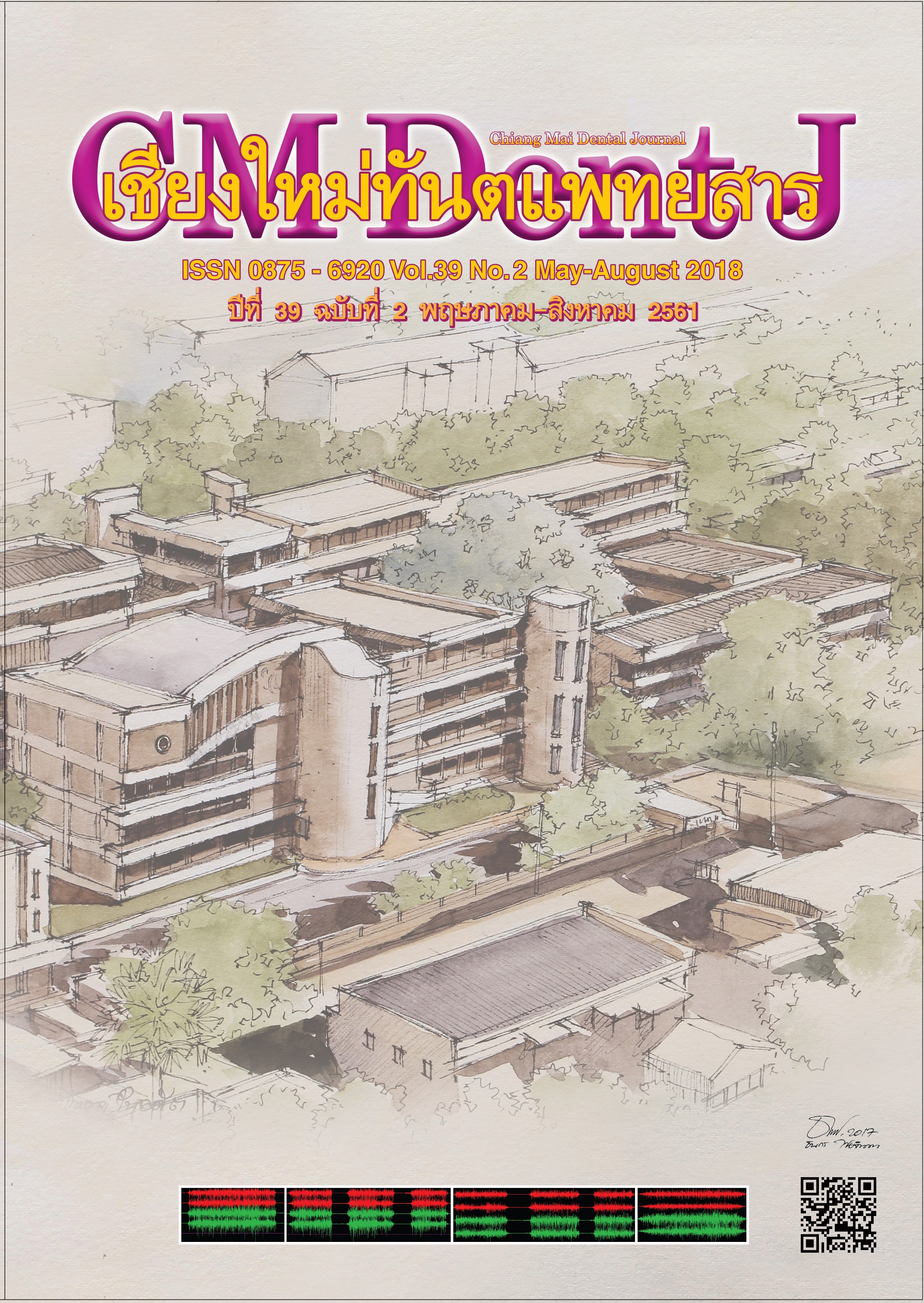Oral Self-care of Muslim Primary Caregivers and Care of Their Children’s Oral Health Aged 3-5 Years Old in a Muslim Community, Trang Province
Main Article Content
Abstract
Objective: To understand the daily oral health care of Muslims primary caregivers. Behavior of oral health care for their children and the relationship between oral health care of Muslims primary caregivers, oral health care for their children and tooth decay in children.
Materials and Methods: The qualitative research was conducted in a child development center in Trang province. All researched children, between 3 to 5 years old, lived in Muslim families. The data collection was based on the informants who were screened by two strategies: 1) the questionnaires distributed to 57 primary caregivers, and 2) purposive sampling was done based on the difference of their religious knowledge relating to oral health, that of education and that of economic status. Their willingness to offer in-depth information was also included. Then, seven cases of primary caregivers were found. Next, an in-depth interview, group discussion and non-participatory observation were conducted, including the scanning of dental caries status of their children. Data analysis was done by typological analysis and analytic inductive technique.
Result: Oral health was viewed by most caregivers as a minor component among the total concern for health. It will become an issue only when it causes an interruption to daily living. The care of their children with oral health problems was found likely to be consistent with the self-care patterns of caregivers. The behavior of oral health care for children were based on the time allocation and direction of care. Only the children whose caregivers had sufficient time for monitoring and care in the direction that promotes good oral health, achieved good oral health. We also found that, the cleanliness of Muslims ablution was very different from cleanliness of dental personnel in terms of meaning and cleanliness measurement.
Conclusion: Oral self-care of the Muslims caregivers and the care of their children’s oral health had a consistent tendency. Muslim children’s oral health were relied on the matter of time allocated and direction of care by their caregivers and there was a mild association relating to religious knowledge.
Article Details
References
Godfrey CM, Harrison MB, Lysaght R, Lamb M, Graham ID, Oakley P. Care of self-care by other- care of other: the meaning of self-care from research, practice, policy and industry perspectives. Int J Evid Based Healthc 2011; 9: 3-24.
Mattiko M. The concept and development of self-care.In: Predasawat P, Kawewongprasert P, Puranun A, ed: Self care: Social and cultural attitudes, 1st ed. Nakornpathom: The Center for Health Policy Studies; 1987: 1-25.
Thongkrajai E. Self-care concepts policy and strategies for the development of public health.In: Sringernyuang L, Hongwiwat T, ed.The strategy for Self Care, 1st ed. Nakornpathom: The Center for Health Policy Studies; 1990: 3-93.
Glavind L, Nyvad B. The scientific basic for oral health recommendations for self-care. In: Gjermo P, ed: Promotion of self-care in oral health, Oslo: Scandinavian working group for preventive dentistry; 1986: 77.
Dental Health Division. The 7th National Oral Health Survey 2012, Bangkok, Thailand. Nonthaburi: Department of Health, Ministry of Public Health, 2012.
Dental Health Division. A survey oral health status and other factors. Risk by age group in 2014 fiscal year [URL of database on internet]. Bangkok; 2013 [updated 2015 Jul 27; cited 2015 May 30] Available from: HYPERLINK “http://www.yimsodsai.com/upload/frontDownload/” http://www.yimsodsai.com/upload/frontDownload/
Thitasomakul S. Dental caries, oral hygiene and dietary habits: A study of 2 to 6 years old Buddhist and Muslim Thai children. PhD thesis. University of Aarhus, 2001.
Petchwijit T. Factors associated with early childhood caries: A Study of 18-36-Month-Old Buddhist and Muslim Thai children in Tha Sala district, Nakhon Si Thammarat Province. Master of Science (Pediatric Dentistry). Chulalongkorn University, 2004.
Katepongpan S, Hintao J, Yoonwong N. Efficacy of The Sweet Enough Network Project in Trang on sweetened food consumption among children aged 3–5 years. Songklanakarin Dent J. 2014; 2(1): 24-39. (in Thai)
Watanapa A. Self and oral health: A muslim community in Songkla province. Doctor of Philosophy (Medical and health social sciences). Mahidol University, 2004.
Sukcharoenkosol H. The relationships between individualistic factors of parents, socio-cultural factors and oral health care related behavior of parents of 0-5 year-old-children in Tombon On Klang, King Amphoe Mae On, Changwat Chiang Mai. Master of Science (Preventive Dentistry). Chiang Mai University, 2002.
Tuongratanaphan S, Chata S. Lifestyles of Grandparents, Main Caregiver, Related to Oral Health of Children Age 1-3 Years, Baan Lao, Bann Phang District, Khon Kaen Province. CM Dent J 2014; 35(1): 107-117. (in Thai)


